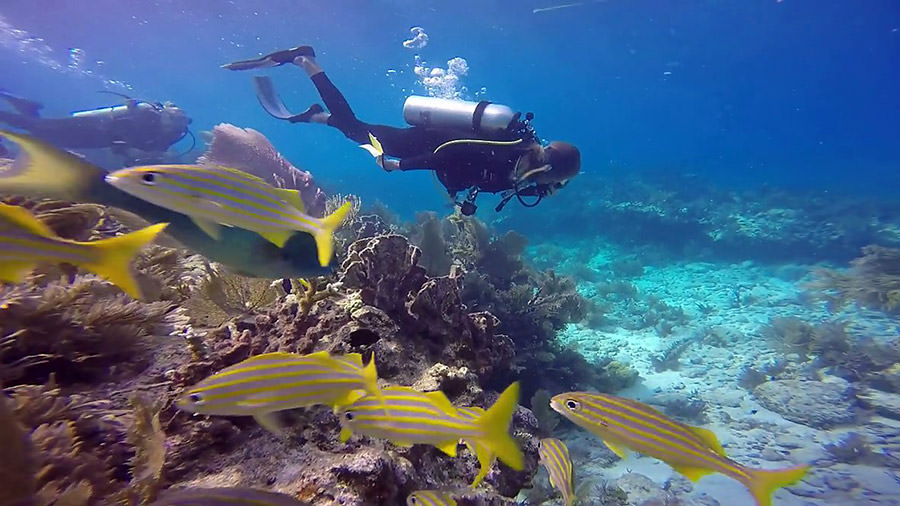Florida Keys National Marine Sanctuary supports one of the most diverse assemblages of underwater plants and animals in North America. Here are simple ways you can have a fantastic time enjoying the Florida Keys while still Protecting the Reef.
Protecting the Reef – Keep your distance.
Maintaining a safe distance from corals and other organisms helps protect the reefs of Florida Keys National Marine Sanctuary.

Coral reefs are captivating and awe-inspiring, but while below the surface, remember the impact human contact has on the reefs. Maintain proper buoyancy and refrain from touching, kicking or standing on the coral. Keep all of your equipment secure, and establish a safe viewing distance from the reef and other marine life. Although typically unintentional, even minor interactions can have devastating cumulative impacts on reef sustainability — remember, you are one of nearly 3 million visitors to the Keys each year, and everyone’s bumps and touches add up.Marine life prefer not to be bothered by paparazzi, so if you’re photographing your experience, be considerate of your presence in this habitat. By being conscious of yourself and your equipment in the water, and keeping your distance from the reef and marine life, you can help keep coral reefs healthy.
Protecting the Reef – Choose sustainable skincare options

Certain types of skin-care products contain chemicals that have negative impacts on corals and other marine life. Although we are encouraged to lather ourselves with sunscreen to protect our skin from the sun’s harmful rays, some chemicals become pollutants the moment we enter the water.
Protecting yourself from harmful UV rays is important, but choosing safer chemicals reduces impacts to marine life. Active ingredients such as oxybenzone (BP-3) and benzophenone can be toxic to corals, making it hard for coral larvae to survive and settle on substrates. Make a difference by opting for mineral-based alternatives such as zinc oxide or titanium oxide and relying on long sleeves, hats and shade to reduce the amount of sunscreen you need to protect yourself from the intense Florida sun.
Microbeads are another artificial additive to watch out for when you’re reading the label for skincare products. These tiny plastics are bad news for marine life, as they can be ingested by hundreds of species, including marine mammals, sea turtles and fish. The plastics can harm animals’ digestive tracts, causing cuts or inflammation. They can get lodged in stomachs and intestines, blocking up digestive systems and interfering with proper nutrition. As if that weren’t bad enough, microbeads have been shown to absorb organic chemicals that persist in the environment, such as polycholorinated biphenyls (PCBs). Many of these chemicals harm animals by accumulating in their livers and disrupting their endocrine system.
You can see several more ways of Protecting the Reef here: Source: 5 Ways to Enjoy the Florida Keys While Protecting the Reef | Office of National Marine Sanctuaries
